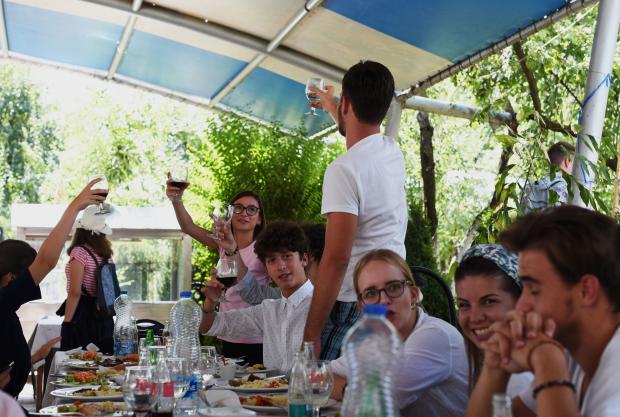Finding a collective voice
Ten kilometers outside Prishtinë/Priština, set within the peace and tranquility of the Amazona Hotel’s garden, participants of the OSCE’s Academy of Language and Culture are sitting down for lunch.
Surrounded by leafy, emerald green apple trees and adjacent to an elegant swimming pool, the atmosphere is one of excitement.
The participants in the Academy, from Prishtinë/Priština and Belgrade, Vushtrri/Vučitrn and Niš, converse freely and burst into song spontaneously at irregular intervals. One would have little inkling that these young people have been separated by linguistic and cultural barriers for much of their lives. This, it seems, is a group of life-long friends.
Academy’s Inception
The Academy of Language and Culture was an initiative of the alumnae of another OSCE-supported programme which brought together young women from Prishtinë/Priština and Belgrade - the OSCE Dialogue Academy for Young Women (DA), held annually in Austria since 2015.

The women, inspired by their own experiences, spearheaded this new initiative after one of their party, Milena Beran, who speaks both Albanian and Serbian, began teaching everyone some basics whilst attending one of the Dialogue Academies. “We had a laugh and bonded over it in the evenings. From there it all started because we saw how much it helped us and thought that it could help other people bond as well,” explains Anja Jokić, a master’s student and fellow DA alumna from Belgrade.
The Academy of Language and Culture, created with the help of the OSCE, brought together young people to provide them with basic knowledge of Albanian and Serbian languages and inter- and intra-cultural exchange.
Besides learning each other’s language and interacting, they also visited and met with a group of participants of the OSCE-supported Albanian and Serbian language classes in the municipality of Obiliq/Obilić.
Women in lead
The three DA alumnae, initiators of the Language and Culture Academy, Anja, Alba Jakupi and Milena, sit at the end of the busy table, conversing in a mix of English, Serbian and Albanian, explaining words to each other in their mother tongues; they feel as though it has been a genuinely special project.

“Not only have they improved their language skills but they have bonded beautifully, they genuinely want to spend as much time together as possible,” Anja tells me.
It’s a total mix and you don’t notice where people are from anymore.
Milena BeranInitiator of the Language and Culture Academy
As we speak, members of the language academy come up to the trio, laughing and chatting away. I am shown videos of the activities, from exploring the historic centre of Prizren to bi-lingual karaoke, the activities are far-ranging and the enthusiasm of the group is palpable. Few participants seem excited about the prospect of leaving their new-found friends.
By all accounts, the karaoke was the highlight of the week. Participants sang songs in the language they had learnt and hilarity ensued. Activities like this, Alba believes, serve to show the similarities of the languages. “Even in the languages where we have some words that are the same, maybe the pronunciation is a little different,” she says. “When someone says something in their language that sounds familiar, someone else will say ‘oh we say that in my language as well.”
Commitment to peace
A commitment to breaking down cultural barriers through the promotion of bilingualism has been central to the creation of the OSCE Academy of Language and Culture. It goes further than the individuals gathered in the sun-lit garden.
“A lot of my friends have changed their mindsets; they no longer see Kosovo as a place they would not go to,” says Anja. “Rather, they see that I come here frequently and have fun.”
The DA alumnae, whose activism and creativity has been central to the Academy’s success, believe that such initiatives normalise positivity, rather than perpetuating stereotypes, as is often the case when cultural ties are extinguished. They have realized the value of bi-lingualism and cultural interaction and worked to inspire others to come to this same realization.
The Academy is not only an activity, it is a demonstration of what groups from Belgrade and Prishtinë/Priština can accomplish by working together with joint forces.
Minja Mijatović OSCE organizer and alumna of the Dialogue Academy
It is this attitude of co-operation that has defined the activism of these young people, the belief that to work together in the face of significant adversity is the only solution to decades of animosity.
The OSCE Academy of Language and Culture was, first and foremost, an opportunity for participants to interact with another culture, to have fun and learn.
However, perhaps more importantly, it represents a brave move by a group of young activists towards looking past cultural differences, using their own experiences to inspire others. It emphasises commonality, co-operation and finding a collective voice.
Language enables connection; it allows those who believe they have nothing in common to realize their previous judgement was misplaced.
It provides a focal point of communication, for the exchange of ideas and the lifting of suspicion. Learning a language is a challenge. However, these Academy participants, aided by DA alumnae, are facing it head on.

